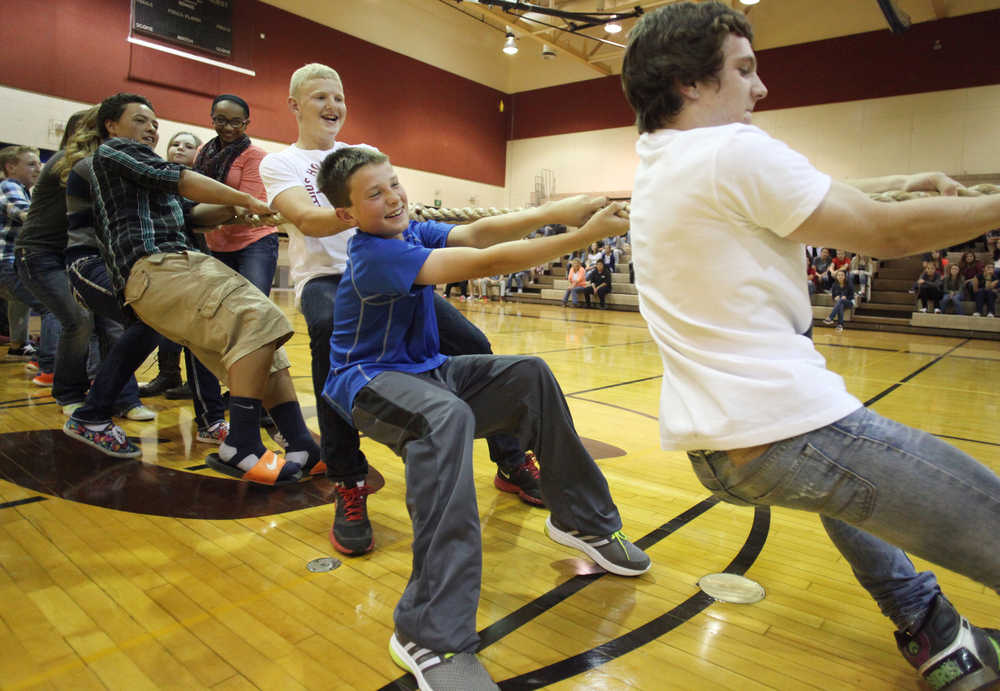From recess to advanced electives to lessons in conflict resolution, students, teachers and administrators have much to justify their palpable optimism at the start of the 2015-2016 school year.
Classes officially began with the ring of the bell Wednesday morning at most Kenai Peninsula Borough School District schools.
By Thursday afternoon, Mountain View Elementary fifth grader Adrienne Maxi had already landed in school Principal Karl Kircher’s office, but it was only to discuss her elation for the new year.
“I am excited about a lot of stuff,” Maxi said. “I forgot how fun school was.”
This year Maxi is surrounded by familiar faces in her classroom, since she has been enrolled at the elementary school since preschool. She is looking forward to her favorite subject — math.
“I am excited to build up my learning, and have a good education so I can have a good job when I am older,” Maxi said. “I want to be a doctor, so I know I will be in college for a while. Or I want to be teacher.”
Within her first two days back, Maxi’s teachers are already talking about what Kircher calls, Mountain View’s “school climate,” or the importance of implementing kindness into all interactions.
Maxi said she feels she has been prepared to make friends and keep them, which are skills she will use frequently in her adult life.
A younger peer of Maxi’s and a new face at Mountain View, kindergartener Donte Bolton, said he is excited to read books, make friends and master the monkey bars this year.
“The red ones, the twisty ones, I can’t get over,” Bolton said, squirming in his seat. “I don’t know why.”
Bolton has already absorbed an important lesson at his new school. He has discovered, along with many of his classmates, the importance of being quiet, which makes learning easier.
Kircher said, while teachers at Mountain View take it easy and try to make the first week fun for their students, it is important to develop routines.
“We develop those around our school climate so the kids feel comfortable,” Kircher said. “We start to add more onto their plate as the weeks go on.”
Many administrators make comfort and school spirit a priority for the first few days back.
Soldotna Prep Principal Curtis Schmidt mobilized the entire ninth grade class Wednesday in an assembly filled with tug-of-war, musical chairs and cutthroat rock-paper-scissors. He said he uses the gathering as a way to get the kids excited about being back in the classroom, and establish a little school spirit.
Sitting in the gymnasium bleachers, watching his peers battle for folding metal chairs, Ben Vanhoose said he isn’t nervous to be in the new school, or afraid his course work will prove too challenging.
He is glad he will spend the entire year with students his own age before moving on to high school, he said.
Special Services Teacher Peter Gundunas watched the group of entirely new faces from the corner of the room. He has been at the freshmen-only house since it opened for first time at the beginning of the 2014-2015 school year during the reconfiguration of Skyview Middle School, Soldotna High School and Soldotna Prep.
While there may be a few minor bumps to smooth out, it is more likely the students will yield even stronger academic performances this year, Gundunas said. Soldotna Prep’s educators and administration are more experienced at delivering the instruction focused solely on ninth grade success.
“If a kid makes it through ninth grade, they have a 90 percent chance of graduating high school,” Gundunas said. “If they don’t, that number drops significantly.”
Teacher Matt Fischer said he is looking forward to the sixth and seventh graders at Skyview Middle School having an equally successful year during the second year of the reconfiguration.
“We are ready to rock and roll and the kids are excited to come into the building,” Fischer said. “We get to advance our programs even more than last year.”
While Kenai Central High School Principal Alan Fields isn’t reporting any major changes in or outside the school’s classrooms this year, there is no shortage of progress.
The teachers are using their Professional Communities — core groups of teachers that work together to assess instructional services — to look assess approaches to grading.
Fields said some educators are looking at giving their students more chances to retake assessments, and focusing more on how much a student has learned, instead of their final test scores.
“I think we are about continuous improvement. I liken it to professional athletes,” Fields said. “When you stop trying to improve your game, that’s when you should get out of the game. That’s what we are asking our kids to do, so that’s what we need to do.”
Reach Kelly Sullivan at kelly.sullivan@peninsulaclarion.com

